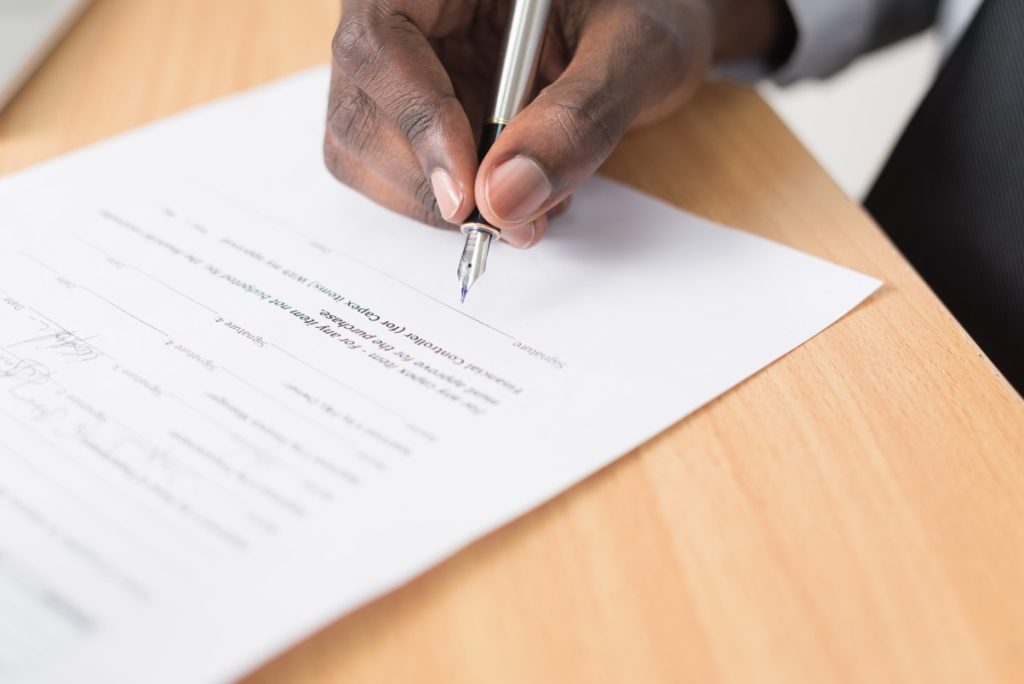Conveyancing is usually the longest part of selling or buying a property and starts when you’ve had an offer accepted or have accepted one on a property. It’s the legal process of transferring ownership from seller to buyer. Usually taking 12-16 weeks, it involves 8 key stages comprising a good dose of paperwork and legal checks. Your conveyancer or solicitor will handle most of it, guiding you through the various stages.
Here’s the eight stages of the conveyancing process:
1) Instructing a conveyancer or solicitor
The first step is finding a good conveyancer or solicitor. They’ll handle all the legal work and keep the process moving.
When choosing, don’t just go for the cheapest option available. Look for someone with experience and good reviews. Ask friends for recommendations and research to see what conveyancers offer and charge.
Check if your chosen conveyancer is on your mortgage lender’s panel. If not, you might face delays and extra costs. Many offer “fixed fee” services to help you budget. Some provide a “no sale, no fee” guarantee, so you won’t pay if the sale falls through.
Watch out for very low quotes, as they often have hidden fees. Ask for a full cost breakdown upfront to avoid surprises. Pick someone who’s responsive and explains everything clearly. You’ll be working with them for months, so it helps if you get along and communicate well.
Key considerations when choosing a solicitor
- Check reputation and client feedback
- Make sure they’re on your mortgage lender’s panel
- Ask about their experience with leasehold or new build properties (if applicable to you)
- Cheap conveyancers are often slower as they have lots of clients and limited staff
- Look for someone who communicates well and responds quickly
- Ask for a full breakdown of fees to avoid hidden costs
- Consider ‘no sale, no fee’ options to protect yourself if the sale falls through
Remember the cheapest option isn’t always the best. A good conveyancer can save you time, stress and potentially money in the long run. It’s worth spending a bit more for a smoother, faster process.
2) Pre-contract work and property searches
Once you’ve instructed your solicitor, they’ll start the pre-contract work. This includes property searches to check for any issues that might affect the property or its value. Searches will be done for the buyer against the property being purchased.
Your solicitor will request the searches from various authorities. These typically take two to three weeks but can sometimes go on for longer, especially if the local authority is slow to respond.
The main searches include:
Types of property searches conducted
- Local authority search: Checks planning permissions, building control, nearby road schemes
- Environmental search: Looks at contamination risks, flooding, and other environmental factors
- Drainage and water search: Confirms water supply and sewerage connections
These searches can uncover potential problems like flood risks or planned developments nearby. The solicitor reviews the results and flag any issues. If something concerning comes up, the buyer might need to renegotiate the price or reconsider the purchase.
While searches are underway, the buyer’s solicitor will also start reviewing the draft contract from the seller’s solicitor. They’ll raise any queries about the property’s legal status or boundaries.
3) Drafting and reviewing contracts
The seller’s solicitor drafts the initial contract, which includes property details, sale conditions and a list of fixtures and fittings. The buyer’s solicitor will review this carefully.
At this stage, neither buyer nor seller is legally committed. The buyer can still pull out without penalties if they spot any deal-breakers.
The solicitor will check the contract against the property searches and title deeds. They’ll make sure everything adds up and that the buyer is getting what they think they’re buying.
Raising enquiries
Your solicitor will likely have questions after reviewing the contract and search results. They’ll send these ‘enquiries’ to the seller’s solicitor.
Enquiries can cover anything from boundary disputes to planning permissions. They help uncover potential issues before you’re committed to the purchase.
Sellers must answer honestly, but they’re not obliged to fix problems. If serious issues come up, the buyer might need to renegotiate or reconsider the purchase.
This back-and-forth can take time, especially if the enquiries are complex. But it’s an important step to protect your interests and avoid nasty surprises later.
4) Arranging mortgage and deposit transfers
If you’re getting a mortgage, you’ll need a formal offer in place before exchange. Your lender will carry out a valuation of the property to make sure it’s worth what you’re paying.
You’ll also need to have your deposit ready. This is usually at least 10% of the purchase price, but can be higher. Make sure you’ve got the funds in place well in advance.
Your solicitor will need to see proof of your deposit funds. They’ll also check where the money’s coming from – this is part of anti-money laundering regulations.
Anti-money laundering and identity checks
- Solicitors must verify your identity and check your funds aren’t from illegal sources
- You’ll need to provide ID and proof of address, like a passport and recent utility bill
- Expect to pay £6-£20 for these checks
- If your deposit is a gift, the person giving it will also need to provide ID and proof of funds
These checks can seem like a lot, but they’re a legal requirement. Have your documents ready to avoid delays.
5) Exchanging contracts
Now is when it all starts to get serious. Once you exchange contracts, you’re legally committed to buying or selling the property. If you pull out after this, you’ll lose your deposit if you’re a buyer, while either party could potentially be sued.
The seller is also bound at this point. They can’t accept a higher offer from someone else without facing legal consequences. Before exchange, make sure you’re happy with everything. Double-check the contract, survey results and mortgage offer. Once you exchange, there’s no going back without hefty penalties.
What happens during exchange?
The buyer’s solicitor will call the seller’s solicitor. They’ll read out the contracts to check they’re identical. If all’s well, they’ll agree to exchange.
The buyer needs to pay their deposit (usually 10% of the purchase price) to the solicitor before exchange. During the call, they’ll also agree on a completion date. This is usually one to two weeks after exchange, but can be longer if needed.
After the call, the solicitor will send the deposit to the seller’s solicitor. Contracts are then posted to each other. That’s it—everyone involved is now legally committed to buying and selling the property. Time to start packing.
6) Between exchange and completion
After exchange, there’s still work to do before it’s time to handle the keys. The buyer’s solicitor will finalise the mortgage arrangements and prepare the transfer deed.
They’ll also do a final search at the Land Registry to check nothing’s changed with the property’s ownership. This is called a ‘priority search’ and it protects the buyer’s interest in the property.
If you’re selling as well as buying, your solicitor will use this time to repay any existing mortgage on your current property.
Organising moving and final preparations
Now’s the time to book your removals. Good firms get booked up quickly, so don’t leave it too late. Start packing and decluttering. It’s amazing how much stuff you accumulate over the years. Arrange to take metre readings on moving day. You’ll need these for your final bills.
Check with your solicitor about the situation regarding the keys. Usually, the buyer gets them from the estate agent once the money has gone through on completion day.
Finally, make sure there’s building insurance in place from the date of exchange. The buyer becomes responsible for the property from this point, even though they don’t own it yet.
7) Completion day
This is the day when ownership officially changes hands. The buyer’s solicitor transfers the remaining funds to the seller’s solicitor. Once received, the seller’s solicitor confirms completion.
The property must be vacated by the agreed time, usually around 1pm. Keys are typically handed to the buyer by the estate agent. In a property chain, completions happen in sequence. Solicitors keep all parties informed throughout the day.
When is completion official?
Completion becomes official when the seller’s solicitor confirms receipt of all funds. This typically occurs by early afternoon. At this point, the buyer becomes the legal owner and can collect the keys.
For anyone selling and buying on the same day, there’s often a gap between moving out and getting access to the new property.
Completion day can involve some waiting and potential delays, but it marks the final step in the conveyancing process. By the end of the day, the sale is complete and the new owner can move in.
Post-completion steps
After completion, there’s still some legal work to be done. The buyer’s solicitor will pay any Stamp Duty Land Tax owed within 14 days of completion of the sale. They’ll also apply to the Land Registry to register the new owner. This can take a few months, especially if it’s a new property or there are complications.
The seller’s solicitor will use the received funds to pay off any existing mortgage on the property.
Post-completion paperwork
Both buyers and sellers should keep certain documents safe after completion:
Buyers should retain:
- Property deeds (if paper deeds exist)
- Mortgage paperwork
- Building insurance documents
- Surveys and search results
- Correspondence relating to the purchase
Sellers should keep:
- Evidence of capital gains tax calculations (if applicable)
- Proof of mortgage redemption
- Correspondence relating to the sale
These documents may be needed for future reference, especially when it comes time to sell the property.
Additional information for leasehold and new build properties
Leasehold and new build properties involve extra steps in the conveyancing process.
For leaseholds, the buyer’s solicitor will need to review the lease terms carefully. They’ll also request a leasehold management pack from the freeholder or managing agent. This includes information on service charges, ground rent and any planned major works.
Ground rent and service charges should be all up to date—this comes from the seller’s. Any debts will need to be settled before completion.
After completion, the freeholder or managing agent must be informed of the change in ownership. They’ll update their records for future billing of ground rent and service charges.
For new builds, the conveyancer needs to check that all planning permissions and building regulations have been met. They’ll also review the warranty, usually provided by the NHBC or similar.
With new builds, there’s often a gap between exchange and completion while the property is being finished. The contract will include a ‘long stop’ date by which the property must be ready.
Both leasehold and new build purchases can take longer than standard freehold properties. Be prepared for potential delays and extra paperwork.
Skip the conveyancing and sell your home quickly with Property Rescue
If you’re looking to sell your UK property fast and don’t want to wait 12 to 16 weeks for the conveyancing process, Property Rescue offers quick cash purchases and can complete in as little as 48 hours. We cover all your legal fees and can buy any property, regardless of condition. Get a free, no-obligation quote to see how much your property is worth.









